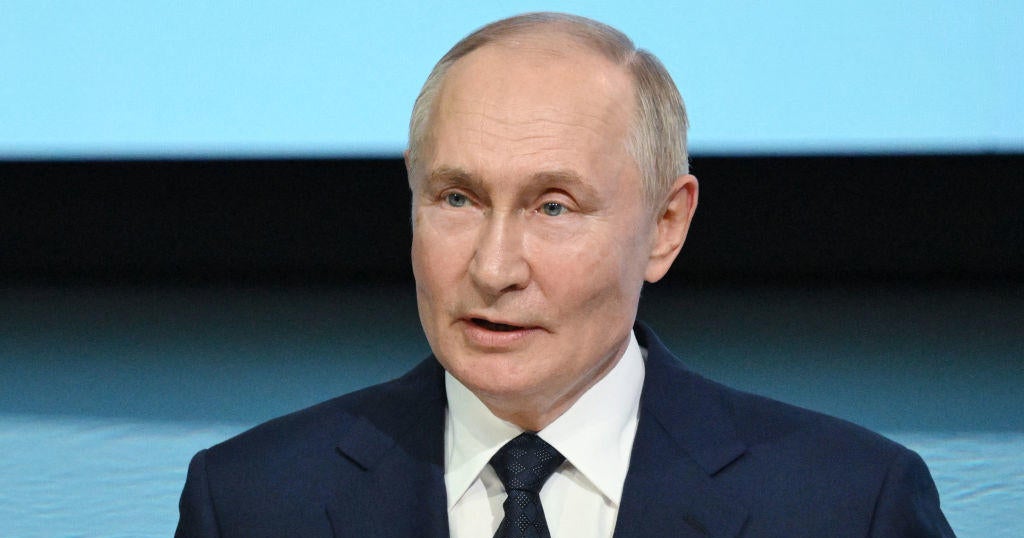Liz Cheney says Russia sanctions "ought to go further" to punish Putin, oligarchs
Washington — Republican Congresswoman Liz Cheney said Sunday that sanctions intended to impose severe costs on Moscow for its invasion of Ukraine should go further and target Russia's oil sector, as well as the families of Russian President Vladimir Putin and those in his inner circle.
"There is certainly more we can do," Cheney, of Wyoming, said in an interview with "Face the Nation." "We ought to be sanctioning not just Putin, not just [Foreign Minister Sergey] Lavrov, not just the oligarchs, but all of their families that this behavior, this aggression against Ukraine is something the world simply cannot tolerate. So the sanctions ought to go further. As I've said, we've made good progress so far."
Cheney said the U.S. and allies "certainly haven't reached the limit" on what consequences it can impose on Russia, but acknowledged there has been "impressive progress."
The Wyoming Republican called on the Biden administration to do more regarding the Russian Central Bank, eliminate exceptions for Russian banks disconnected from the SWIFT financial messaging system and target Russia's energy sector.
"The United States ought to be looking at ourselves frankly as an arsenal of energy for the world in the way that in World War II we were an arsenal of democracy," Cheney said. "We ought to be an arsenal of energy, so we ought to be unleashing our own energy resources, our own energy production. We've got to stop the import of Russian oil to the United States."
The United States and European partners have hit Russia with a series of sanctions in response to Putin's war against Ukraine, and financial penalties ramped up over the past two days. On Friday, the White House announced sanctions on Putin, Lavrov and members of the Russian national security team. On Saturday, the U.S., European Union and the United Kingdom placed restrictions on Russia's central bank and agreed to cut "selected" Russian banks from SWIFT, which disconnects them from the international financial system. Those sanctions join other economic measures against Russian oligarchs and financial institutions, including state-controlled VTB and Sberbank, rolled out last week.
The U.S. has also pledged more than $1 billion in security and humanitarian assistance to Ukraine, with President Biden on Friday authorizing an additional $350 million in military equipment.
But Cheney said there are additional steps the Biden administration can take, including rushing Javelin anti-tank and Stinger missiles to the country. On Capitol Hill, the congresswoman said lawmakers need to approve a supplemental assistance package that she said will be on the House floor this week.
"There are a number of things we need to be doing that make very clear that the United States stands with Ukraine," she said. "And you look at things like Vladimir Putin's threat, for example, this morning about his nuclear forces, that's something that we need to take seriously but we also need to be clear that we're not going to be intimidated."
While Cheney and other Republicans have urged the U.S. to continue its support for Ukraine, a faction of the GOP has instead argued the U.S. should refrain from taking action in Europe, a divide within the party that was made clear by former President Donald Trump's response to Putin's aggression.
Cheney called the embrace of isolationism by some in the GOP "wrong morally" and "dangerous."
"America cannot defend and maintain our own freedom and security if we think that we're going to simply withdraw from the world and not lead," she said. "You know, we are watching today the brutality of Vladimir Putin as he attempts to invade a democratic sovereign nation. And anyone who thinks that U.S. freedom and security is going to be maintained if we take a step back and don't lead, you simply need to look at what's happening in Ukraine to recognize that those who fill the void when the U.S. steps away are people like the Russians, like the Chinese, like the Iranians."
The U.S., she continued, "stands for freedom. America was founded on fundamental principles of freedom. And I think it's indefensible for people to abandon those or suggest that we have no view as between Russia and Ukraine in this battle."
While Cheney was among a group of 10 House Republicans who voted to impeach Trump for his role in the January 6 assault on the U.S. Capitol and now serves as vice chair of the House committee examining the attack, she voted against impeaching Trump in December 2019 for pressuring Ukrainian President Volodymyr Zelensky to investigate Mr. Biden in exchange for military aid and a White House meeting.
Cheney said she doesn't regret her vote not to impeach Trump the first time for his actions regarding Ukraine, but the lessons from the first trial have informed the work of the January 6 committee.
"Any impeachment vote has got to be one that is based very clearly on the evidence," she said.



